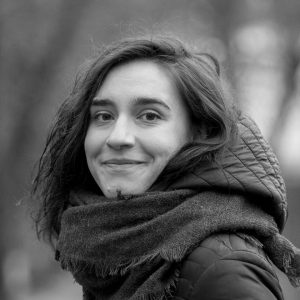The Post-Truth Phenomenon in Theatre and Cinema: Creative Strategies
Doctoral student: Živilė Elena Mičiulytė
Supervisors: Prof. Janina Lapinskaitė, Assoc. Prof. Dr. Ramunė Balevičiūtė
Consultants: Prof. Audrius Stonnys, Assoc. Prof. Dr. Renata Šukaitytė
Department: Cinema and Television
Intended duration: 2016–2020
Abstract
The research part of the artistic doctorate project The Post-Truth Phenomenon in Theatre and Cinema: Creative Strategies presents the post-truth phenomenon which became popular in 2016 in social science, communication, and political science discourses. The Oxford Dictionaries announced a term post-truth as a word of 2016; i.e., a word that can best reflect all this year. This term describes the political and social reality that became popular in that year, in which objective facts are less able to influence public opinion than a sensual and emotional statement. It also describes the phenomenon where the existence of objective truth is simply ignored, and alternative facts are created – and this makes this phenomenon more dangerous than lies (the Referendum in the United Kingdom on the country’s withdrawal from the European Union {Brexit} and the US presidential election campaign are the main political events that are associated with the activation of this condition).
The paper raises the following questions: How this public situation, that has undergone changes, and a crisis of truth and objective facts may affect theatre and documentary cinema? What creative strategies, which help to critically reflect on the phenomenon of post-truth, are found in theatre and documentary cinema? In these days, in the relationship of documentary cinema with the audience, their expectations, rather than reality, becomes more important. While it may seem that documentary cinema and the phenomenon of fake news arise from different impulses and their goals are opposite, a closer look may reveal that these two phenomena are united by the fact that they both reflect the same growing ignorance of the truth, and such change in the context of post-truth can be extremely threatening. A growing number of documentaries that deconstruct and criticize these circumstances of post-truth occur as a response to such situation – the thesis identifies creative strategies that can help with that. No analogous change and ignorance of the truth is observed in theatre – perhaps because theatre never pretended to be true, as is the case with documentary cinema. However, the creative strategies that take a critical look at these post-truth situations and, perhaps, even the other way around, are seeking in full fiction (theatre) for truth, reality, and points that connect rather than divide us, are also noticeable in theatre.
The creative part of the artistic research project consists of two works that reflect and complement the strategies identified in the part of the case study. The first is a performance of Klaipėda Youth Theatre Last updated (premiered in 2017) which, both by its topic and form, explores the phenomenon of manipulation, various conspiracy theories, and the disappearing boundaries between reality and fiction. The second is a documentary about investigative journalists that is currently under development, since the issue of journalism is extremely pressing in the epoch of post-truth. This public post-truth situation is closely related to a varied communication of politicians and other persons (especially those in positions of power) with the public, and the very concept of truth and its value that has undergone changes. Correspondingly, this also relates to the problematic situation of journalism, especially investigative journalism. This type of journalism is primarily associated with deep research, the search for objective and reliable facts; i.e., with factors that are becoming less important these days. Journalists are like a counterweight to the alternative facts emitted by various alternative channels; the film aims to disclose this side of the work of journalists and the difficulties they face, that are caused by politicians who wish to restrict the freedom of journalists.


